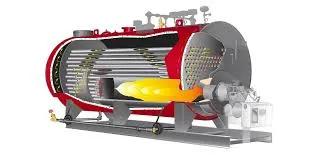
Nov . 17, 2024 11:55 Back to list
Understanding Steam Boiler Thermal Efficiency and Its Impact on Performance
The Thermal Efficiency of Steam Boilers A Comprehensive Overview
Steam boilers play a critical role in various industrial processes by generating steam that powers machinery, provides heat, and drives energy generation systems. Central to the effective operation of a steam boiler is its thermal efficiency, which measures how well the boiler converts fuel energy into usable steam energy. Understanding and optimizing thermal efficiency is paramount for reducing fuel costs, minimizing emissions, and enhancing system performance.
Thermal efficiency can be defined as the ratio of the heat energy output to the heat energy input. In simpler terms, it indicates how effectively a boiler transforms the energy contained in the fuel into steam energy. A higher thermal efficiency means that more of the fuel's energy is utilized, while a lower efficiency implies greater energy losses, often in the form of waste heat.
Several key factors influence the thermal efficiency of steam boilers. First and foremost is the design of the boiler itself. Modern boilers are often constructed with advanced materials and technology, allowing for better insulation and heat transfer capabilities. For instance, water tube boilers generally have higher efficiencies than fire tube boilers due to their larger surface areas and better thermal characteristics.
thermal efficiency of steam boiler

Fuel type also significantly impacts thermal efficiency. Natural gas, for instance, typically yields higher efficiencies than coal or oil, as it burns cleaner and produces less soot and residue. Moreover, the quality of the fuel can affect combustion efficiency; high-quality fuels lead to more complete combustion, resulting in lesser heat loss.
Another crucial factor is boiler operation and maintenance. Regular inspections, cleaning of heat exchange surfaces, and timely repairs can prevent efficiency losses related to fouling or scaling. Operators must also monitor burner performance, ensuring optimal air-fuel mixtures during combustion to maximize efficiency.
Additionally, the implementation of advanced control systems can enhance the thermal efficiency of steam boilers. Smart technologies that monitor various parameters, such as temperature, pressure, and steam quality, allow for real-time adjustments to improve performance.
In conclusion, the thermal efficiency of steam boilers is a vital aspect that directly influences energy consumption, operational costs, and environmental impact. By focusing on factors such as design, fuel quality, maintenance, and advanced technologies, industries can significantly improve efficiency, thereby ensuring sustainable and economical operations. As the demand for energy-efficient solutions continues to grow, optimizing steam boiler performance will remain a key focus for engineers and operators alike.
-
High-Efficiency Commercial Oil Fired Steam Boiler for Industry
NewsJul.30,2025
-
High-Efficiency Biomass Fired Thermal Oil Boiler Solutions
NewsJul.30,2025
-
High Efficiency Gas Fired Thermal Oil Boiler for Industrial Heating
NewsJul.29,2025
-
High-Efficiency Gas Fired Hot Water Boiler for Sale – Reliable & Affordable
NewsJul.29,2025
-
High Efficiency Biomass Fired Hot Water Boiler for Industrial and Commercial Use
NewsJul.29,2025
-
High-Efficiency Biomass Fired Hot Water Boiler for Industrial Use
NewsJul.28,2025
Related PRODUCTS






















